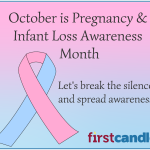We Need to Start Talking About SIDS
Last week a study came out with the disturbing finding that less than half of parents surveyed consistently and exclusively put their baby on his or her back to sleep. This unfortunately supports the concern of First Candle that a large percentage of parents either believe that “SIDS has been solved” or that the risk of SIDS compared to other issues is not as great. To be clear – SIDS is still the leading cause of death for infants one month to one year of age.
The rate of SIDS dropped dramatically in the mid ‘90s when the government launched the Back To Sleep campaign which is regarded as one of the most successful public health campaigns ever. But the rates of SIDS began to plateau around 2005 and have effectively stalled.
The new study found that while 3 out of 4 new mothers intend to place their baby to sleep on his or her back only about 44% do it consistently. Additionally, the study found that mothers who were African-American or didn’t complete high school were more likely to put babies to sleep on their stomachs. This points to several issues:
· When a parent is exhausted and desperately needs to sleep he or she will do whatever it takes to get their baby to sleep.
· We haven’t explored with parents their reasoning for placing their baby in an unsafe sleep position. There can be cultural, logistical and economical issues surrounding their choice.
· A lack of knowledge/experience and self-confidence among these two most vulnerable groups could prevent them from insisting upon back sleeping when it comes to other caregivers.
It starts with redefining the issue. SIDS is just one subset of sleep-related infant deaths which includes accidental suffocation. While great strides have been made in unraveling the mystery of SIDS we still have no way of preventing it. Parents can argue that if we don’t know how to prevent it they feel helpless and can’t accept that back sleeping is necessary. However, when you change the conversation to include accidental suffocation, parents feel this is something they can control.
We also must do a better job at understanding the challenges mothers face in creating an overall safe sleep environment which includes room sharing not bed sharing with nothing in the sleep area including blankets, pillows, stuffed animals or other loose items. Educating mothers about these recommendations and also listening to the challenges they face in adhering to them and problem solving to overcome them is what will bring about change.
 This year First Candle launched the Straight Talk for Safe Sleep program – a two-part initiative aimed at training local community partners (public health nurses, social workers, clergy and daycare providers) on safe sleep guidelines and teaching them how to engage in a dialogue with parents on their obstacles and objections surrounding safe sleep. The second part is a Parent Workshop where the trainers host new and expecting parents for an interactive session on safe sleep and the importance of breastfeeding. Discussions on cultural beliefs, logistical challenges and developing the self-confidence to insist on back sleeping for anyone watching their baby are addressed. Parents are also provided with portable cribs, wearable blankets, pacifiers and other products to help promote safe sleep.
This year First Candle launched the Straight Talk for Safe Sleep program – a two-part initiative aimed at training local community partners (public health nurses, social workers, clergy and daycare providers) on safe sleep guidelines and teaching them how to engage in a dialogue with parents on their obstacles and objections surrounding safe sleep. The second part is a Parent Workshop where the trainers host new and expecting parents for an interactive session on safe sleep and the importance of breastfeeding. Discussions on cultural beliefs, logistical challenges and developing the self-confidence to insist on back sleeping for anyone watching their baby are addressed. Parents are also provided with portable cribs, wearable blankets, pacifiers and other products to help promote safe sleep. 
The program was piloted in Detroit in partnership with C.A.R.E., a local coalition of social service agencies, non-profits and churches spearheaded by Bishop Reginald Bluestein. To date we have held 4 Train the Trainer Sessions training 125 people and 6 Parent Workshops educating 430 parents. The response from both parents and community partners has been incredible and the program is growing. We are now rolling the program out in Connecticut in Norwalk, Bridgeport and Derby followed by communities in New York, Indiana and Texas.
Communicating with families and understanding their unique challenges is the only way we will make a difference and start once again seeing a reduction in the rate of SIDS and sleep-related infant death.
First Candle is a national non-profit committed to the elimination of Sudden Infant Death Syndrome, Sudden Unexpected Infant Death and preventable Stillbirths through education and research while providing support for grieving families who have suffered a loss.




